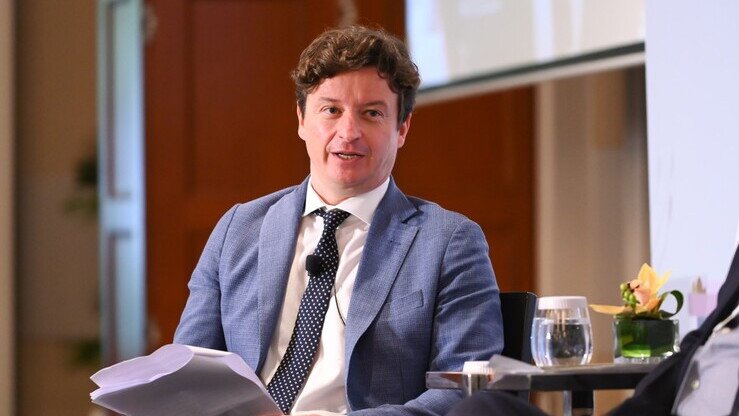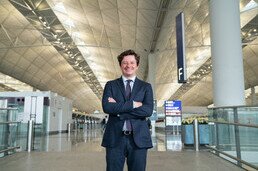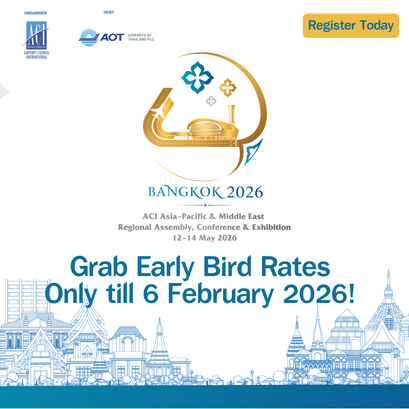View from the Top: Half Year Reflection
- 2022-08-05
ACI Asia-Pacific Director General Stefano Baronci, talks about the appointment of a new Regional Board President, the need to focus on decarbonisation, plans for a Middle East, and ACI Asia-Pacific’s advocacy efforts during the first half of 2022.
In many ways, the summer of 2022 sparked a fresh lease of life for aviation industry. COVID-19 cases are beginning to decline across the globe, travel restrictions and border controls are being eased, people are returning to fly like they used to, and as a result, air traffic is showing green shoots of recovery.
As the industry navigates its way back into the post-COVID-19 world, ACI Asia-Pacific successfully brought together the industry leaders and stakeholders for an in-person Annual Board Meeting & Regional Assembly in Singapore, the first since the onset of COVID-19 pandemic. For a few aviation leaders in the Asia-Pacific and Middle region, it was a refreshing break, meeting one another and sharing best practices, amidst the industry's transition from COVID-19.
The meeting was significant in many ways as several key decisions were made. To begin with, Mr. Emmanuel Menanteau, representing Cambodia Airports, was appointed as new president, leading the charge from June 1, 2022 to end of 2024. He succeeded Mr. Seow Hiang Lee, CEO of Changi Airport Group, who will continue to be part of the Board as Immediate Past President.
Asia-Pacific and Middle East now have a strong voice at the ACI World Governing Board as the region is represented by Mr. Menanteau, ACI Asia-Pacific Regional Board Director Mr. Fred Lam (Airport Authority Hong Kong) as regional advisor and Mr. Aimen Al Hosni (Oman Airports) as the Chair of the Board.
Focus on Decarbonisation
The airports in our region is placing a greater emphasis on decarbonisation. Efforts toward reducing emissions have received a boost after our Board passed a resolution urging all members to voluntarily commit to net zero carbon emissions and develop action plans to reduce emissions through the use of low carbon technologies in airport operations and infrastructure management. This resolution is consistent with the United Nations’ Special Report on Global Warming, which recommended all sectors to achieve net zero human-caused carbon emissions by 2050.
It is very evident that our airports are already making significant progress in their sustainability journeys. 12 airports were recognised for their outstanding achievements in carbon management under the Green Airport Recognition 2022 programme. Participating airports demonstrated exceptional best practices in their respective decarbonisation journeys, specifically in Scope 1 and Scope 2 carbon emission reductions. We hope to see many more in the coming years.
ACI in Middle East
To strengthen cooperation and partnerships with airports and stakeholders in the Middle East, it has been decided to establish a sub-regional office in one of the Middle East countries. This will help further customise our programmes to efficiently serve our members in the Middle East region.
Enhancing Standards
ACI Asia-Pacific also entered into an important Memorandum of Understanding with our Associate Member, CAAS, and ACI World, to conduct research and jointly develop and deliver training programmes for aviation professionals. As an immediate area of focus, ACI World, ACI Asia-Pacific and the CAAS will jointly develop and deliver the first global training programme on sustainable airport development and management by the end of this year.
Favourable Policy Key to Recovery
The key to achieve a truly sustainable recovery of aviation is only through easing of international travel restrictions, increased vaccination coverage, health security and supportive policies from governments. At the same time, the sector will need to prepare for future shocks.
Although most airports are optimistic about the recovery of passenger traffic as an increasing number of countries such as Cambodia, Singapore, India, Thailand, Vietnam and Malaysia have withdrawn the restrictions on international air travel. However, border restrictions in some key markets, including China and Japan, and the subsequent renewed social restrictions and tightening border controls have cast a shadow over the recovery.
To prove the effectiveness of the travel restrictions, we commissioned a study, carried out by OXERA & Edge Health, which revealed that travel restrictions such as quarantine and testing would be, to a large degree, ineffective in mitigating the spread of COVID-19. The key findings provide ample justification to review and withdraw restrictions on international air travel to bring the region back to its leading position for air travel and tourism. Read the Study.
Keeping this as a base, we engaged with the Government of Japan recommending them to remove all restrictions by providing them the evidences. The withdrawal of complete restrictions in Japan is likely to provide a significant boost to the aviation in the region.
ACI Asia-Pacific will continue to step up its effort in advocating for a pragmatic and risk-based approach to reopen borders as part of an effort to facilitate international air travel.
Strong Advocacy
Addressing the ASEAN States at the Air Transport Working Group (ATWG) meeting in Singapore, we had the privilege to provide an overview of the significant progress achieved to reopen to international traffic. To support the recovery process, we utilised aviation and trade events, talking about the need to harmonise the health protocols, reconsider the bans and adopt a risk-based approach. At the Future Aviation Forum in Riyadh, Saudi Arabia, we emphasised the need for a policy and regulatory framework that is harmonised, promotes cooperation and provides solutions to emerging challenges of global importance.
Meanwhile, we had the honour to participate in the Peer Review for the MATAR preparations for FIFA World Cup Qatar 2022 for the Qatar Airports. It was indeed satisfying to see how airports are preparing to host the global event.
Looking Forward
To assess the recovery of industry, Industry Outlook, a quarterly performance analysis of the industry, was launched. In the first quarter of the year (Jan to March), the region witnessed signs of recovery, bringing cheer among members. Although the passenger volume still remained low compared to pre-COVID, Cargo proved to be a key revenue generator and now the stage is set for air cargo to grow. Despite an improving trend, airport financial margins, too, remained far below pre-pandemic levels and are economically unsustainable. The next edition is scheduled in July 2022 and will include a focus on one of the challenges faced by the aviation sector, regionally as well as globally -- the lack of adequate workforce to handle fast-growing volumes of passenger traffic with increased health protocol requirements. Read the Outlook.
Despite the subdued environment created by the pandemic, the future looks bright for air travel. I strongly believe, with the reopening of borders of some key aviation markets in the region, and removal of travel protocols in some parts of the region, we are likely to see more positive trends.








